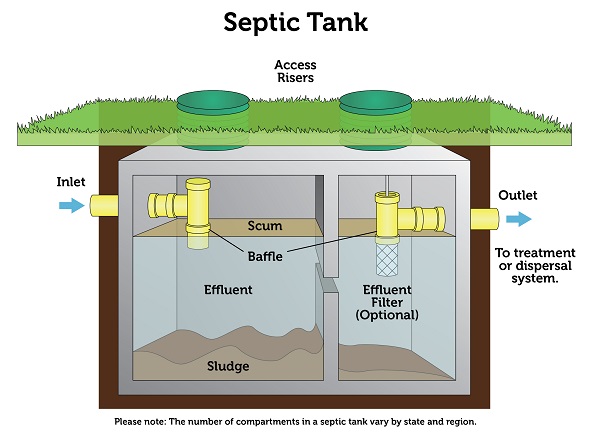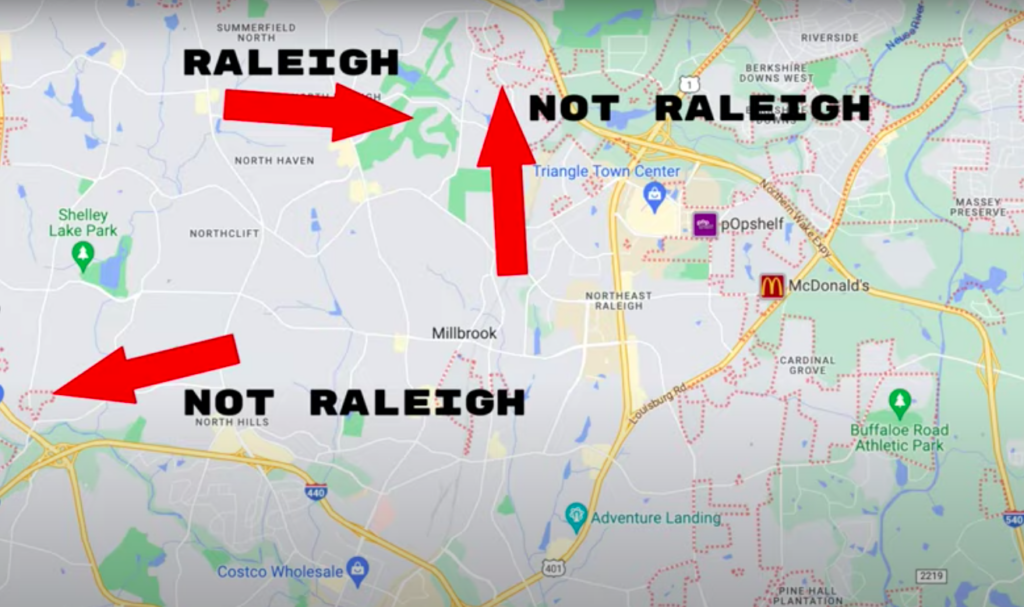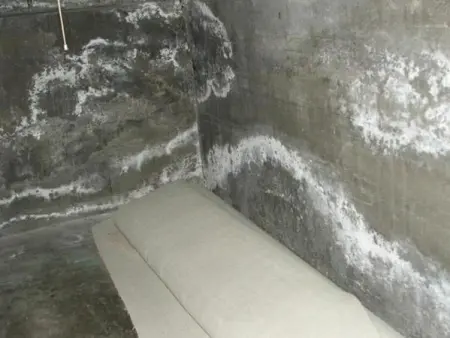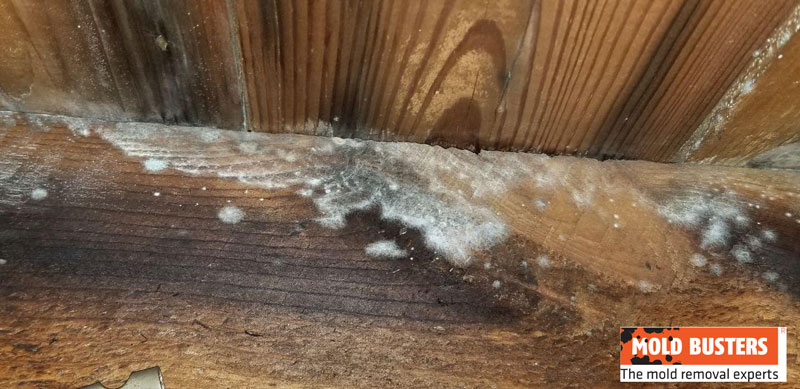What do you need to know before moving to North Carolina?
I asked a lot of my former clients what were the most shocking things that they found when they bought a house here.
This is a compilation of everything that they told me about moving to North Carolina.
These aren’t necessarily in any particular order, I’m just kind of throwing them out there.
1. Septic Systems
The first thing you need to know about moving to North Carolina, especially if you’re coming from a larger city is how common well and septic systems were in this area.
In Wake County, about 14% of homes had a septic system instead of city sewer, which is actually a huge deal.
And it’s even bigger when you realize that if you want to buy a single-family home under $500,000, you’re probably not going to be in Wake County. You’re probably going to be in one of the surrounding counties. It’s pretty likely that you’ll come across this if you move into the Triangle area. There’s actually a lot to know about having a septic system!
A Little Bit About Septic Systems
Having a septic system is like having your own sewage treatment plant in your yard.
It does require some maintenance, but it’s not super expensive.
It costs maybe $200 to have it pumped every other year. Another thing to know is properties that have older septic systems are not designed to be as user-friendly as the newer ones are. Timothy and I owned a house that was built in the 1960s, and it had a 1960s septic system. A well-maintained septic system should last the life of the house.
There are a few things that you need to do to maintain your septic system.
First of all, you need to keep the bacteria at the right levels.
You might need to flush a bacteria packet down your toilet once a month. But in those older systems, there’s something else that we found that we had to do that was really disgusting. Y’all are gonna find this so gross. So in a current, in a modern septic system, there’s a baffle wall that separates the liquids from the solids.

I know you guys are skeeving out right now reading this…it is truly gross.
Older Septic Systems
Our older system didn’t have that. It had a little screen that prevented the solids from pushing out of the tank into the yard.
And that’s what it’s supposed to do. The solids are supposed to stay in a tank. You get those pumped out every couple of years. Then the liquids flow into the septic field and just make your grass really green.
But someone has to clean off that screen every month or two, because it gets clogged with. . . you know. . .
You can pay somebody a couple hundred dollars to clean the screen off, or you can do it yourself, because it takes all of 30 seconds by spraying it off with the hose. You have to do that or it’s going to get trapped. The liquids aren’t going to be able to get out into the septic field.
I actually didn’t know about that until we bought our 1960s house, because we have lived in properties with septic systems for our entire lives. We prefer living in the country, so we’ve always have them and have never had any issues until this particular house. We had to clean this screen off regularly, and it’s pretty gross.
2. City vs. County Taxes: What you need to know before moving to North Carolina
Another thing to know before moving to North Carolina is the difference between city and county taxes.
Some people have no idea! They come here because they think “Oh, the taxes are really cheap”, but you have no idea how cheap they can be if you’re not in the city limits.
And the weird thing is that if you’re in the city limits you can still not be in the city limits, which is totally crazy! There are little pockets of areas that are not city, in the city.

It used to be legal for the city to annex the rural areas outside of the city limits of Cary. If you’re in the county, the laws are different and there are a lot of farms.
The State allowed cities to absorb the areas around them.
There was a big movement here called Stop Cary, because Cary was known for gobbling up all the little pockets of country around it, and turning them into city.
People didn’t like that. The State passed another law that said the city could only absorb the areas around it with the permission of the people living there, which means a lot of people said, “No, thank you. We don’t want whatever town or city to gobble us up.” And so they remained these little county pockets. Our house was in one of those pockets, so we didn’t pay city taxes.
Tax Differences
Here are a few examples of the differences in taxes between homes in the city vs. homes in the county:
For $500,000 a house in the city limits of Raleigh, the taxes were $3,402.
A lot of you call me saying your taxes are like $10,000 or $15,000, and holy moly that’s crazy! So $3,000 sounds really good, right?!
Well, if you actually go to another property technically outside the city limits, but still geographically right in the middle of the city, its taxes are only $1,862 for the same priced house. So, it can be a pretty startling difference between the city and the county taxes!
3. Before you move to North Carolina, understand how we build houses here: Crawl Space vs. Concrete Slab
The next thing that is shocking to people when they move here, is that properties in North Carolina are often built on a crawlspace.
A crawlspace in a house tends to be an upgrade.
The reason for that is if you have problems with your plumbing, or with anything that’s underneath the house, you can just walk (or crawl) under there and access it.
If you’re on a concrete slab and you have your pipes burst for some reason, (which obviously is not a big thing here because we don’t get that cold, but it does happen,) you’re going to have to excavate under the slab foundation, which is going to cost you an absolute fortune.
When we spent that year in Texas, our next-door neighbor had that happen. The house was on a slab and their pipes burst, they had to excavate, and I think it cost them almost $50,000 to dig underneath their house to fix the pipe. Now if that were to happen underneath a crawlspace, you might be talking $1,000 to fix the pipe. So it’s a huge, huge difference!
Crawlspaces take maintenance
The other thing to know about the crawlspace is like everything else in your house, it takes maintenance.
And a lot of times people don’t even look at their crawlspace when they’re living in the house.
You might live someplace 10 or 15 years, how many times have you actually crawled under the house? Probably never, and if you did, you didn’t know what to look for anyway, so that’s really something that you should have inspected every two or three years just to see what’s happening down there.
This is something that tends to come up a lot in home inspections, because people don’t crawl under their crawl spaces, and because it’s a very moist environment.
Two pretty common things that can happen in the crawl space:

Problems in the Crawlspace: Moisture
Rain water that’s not properly directed away from the house can flow under the house. It can pool under there and can cause a really moist environment that causes rot and fungus growth.
It’s not only rain and pooling water that can cause trouble, our humidity is enough that it can cause the same type of damages.
Left untreated, rotting wood in your foundation can become pretty dangerous, your house could fall down, right?
However, I’ve never seen anything that severe happen.
What they do to prevent this from happening is to redirect the water away from your crawlspace so that it’s running off away from the house. Water should always
be running away from the house.
What to do about moisture
You’ll often see a vapor barrier in the crawl space, which prevents the moisture in the soil from evaporating into the air.
That moisture in the air then causes things to rot.
So when you go into your crawl space, one thing you can look for is efflorescence on the concrete walls. Efflorescence is this white mineral deposit that you’ll see on the sides of the walls. If you see that, that means they’ve been getting wet and dry, wet and dry, wet and dry, and leaving that mineral deposit on the wall.
You know you’ve got moisture issues if that’s the case. You want to have somebody come out and dig trenches to direct the water away.
The other thing that you’ll see is this little spotty fungus all over the wood, and if you see that, you’ve probably got a moisture problem.
Fortunately, fixing the moisture problem is not a big deal! A lot of times they’ll just put vapor barrier and a dehumidifier down there. So it’s not necessarily that expensive, but it can get expensive if you don’t prevent it in the first place.


4. Trees
The next thing that people told me was very surprising about moving to North Carolina was trees.
A lot of people move here from places that don’t have a lot of trees.
In the south, we’ve got tons of trees. It’s extremely green here, which is really cool. And people are usually really excited about that when moving here. One buyer told me she chose their house because it was covered in trees and they just loved it so much.
She realized after a while that the darkness of it was too much and she didn’t get any sun when all those trees were there.
But honestly, that’s not even the biggest deal with the trees.
I often tell buyers that they really need to look out for trees that might need to be cut down.
Trees require maintenance too!
Trees, like everything on your property, require maintenance.
You can have a big, enormous, beautiful oak tree in your front yard close to your house. But, you don’t want it too close because of the roots. The roots will cause damage, but you can have trees around your house as long as they’re healthy.
If they’re showing any signs of insect infestation or fungal rot, or anything like that, you’re probably going to want to take them down because they could fall on your house.
The other thing is we have a ton of pine trees here and pine trees are the first to fall in a storm.
They have very shallow roots, they drop limbs regularly; that’s just part of what they do!
You’ll see pines get really big and all the limbs will be up at top because they drop the ones on the bottom. You really don’t want pine trees close to your house. They might look cool, but personally, I would cut them down.
We bought an older home covered in trees. The driveway started completely breaking up. We had to break up the entire driveway and rebuild it, because the tree roots had gotten underneath it and started destroying it.
Just remember, nature takes things over.
You know, if you’re going to live in an area, your job is to kind of maintain the area and not allow nature to take over your house, because it will take over your house. And it’s surprisingly quick.
With 20 years of no maintenance, you can have trees growing out of the roof of a house. I mean, it really is pretty quick.
5. What you need to know before moving to North Carolina: Extra-Territorial Jurisdiction
The other surprising thing to people moving to North Carolina is the extraterritorial jurisdiction.
The ETJ, as we call it, is something similar to what I was talking about before, where the surrounding areas of a city can be sucked up by the city limits.
It’s like one mile for a smaller city, or larger for a bigger city.
And if you live in that ETJ zone, you have to obey the zoning laws of the city in which you’re in.
So if you’re in the Cary ETJ you’re going to have to obey the Cary zoning laws. (Even though you cannot vote on those zoning laws.)
For example, this was something that applied to us in particular because we bought a house in a neighborhood that was in the Cary ETJ. It was not in the city limits but it was in the ETJ.
At this time there was this big push for allowing chickens in the city limits. Urban farming was really popular, and all the towns were passing laws to allow you to have chickens.
Cary passed a law allowing you to have five chickens, if you obtained a permit allowing it. That applied to our lot as well.
Similar to burning laws- some people in the country are used to throwing all their leaves in a big barrel and burning them after they’ve finished raking them up. Well, in the town of Cary, you’re not allowed to do that. They come around and collect your leaves.
These are the sorts of things that might apply to you if you’re living in the ETJ. If you want horses, if you want fences built certain ways, those might have zoning laws. So you just need to check those things if you’re in the ETJ.
Same thing applies if you want to add on to your house. The permit is going to come from the city of the ETJ, not the county, even though you’re in Wake County.
You don’t pay taxes to live in these ETJs and you cannot vote to elect your representatives, but you still have to obey the laws that they pass. There’s a little bit of that regulation without representation which is can be a little frustrating, but that’s just the way it is.
6. Weather
All right, now we’re going to talk a little bit about weather. Before moving to North Carolina, you need to know that in NC it can be 80 degrees one day and 30 degrees the next. Seriously.
It’s pretty common that summer comes for a visit in the winter, and then all of a sudden it’s an ice storm or snowing the next day.
That’s a common thing. Along that same vein, everybody knows we have humidity here, but what people don’t tell you is that humidity actually affects your skin.
If you tend to have drier skin or if you’re older, humidity can be really good for your skin because it prevents wrinkles. It keeps your skin more hydrated, so it actually prevents aging – which is really nice assuming you don’t sunbathe all the time. But if you tend to have oilier skin, humidity can lead to breakouts. So that’s something to know.
7. Roads
Another thing you should know before moving to North Carolina is that our secondary roads (the roads all throughout the countryside) are really well maintained!
I know when I drive around other parts of the country, especially up north, it seems like there’s potholes everywhere. It’s not like that here.
We have the number two best roads in the country and I don’t know why it is, but we have really nice roads.
It’s really nice to go for a drive in the country and look at pretty scenery. Overall, driving on our roads tends to be really pleasant.

8. Wilmington Stinks!
If you’re thinking about moving to North Carolina outside the Triangle, maybe you’re thinking about Wilmington.
This is a weird arcane fact. Wilmington has a very strange smell.
People say it smells like cat pee, and for a long time they couldn’t figure out what it was.
Well, it turns out it’s there’s a factory there that makes some kind of plastics, and there’s some kind of chemical that they use that makes the air smell like cat pee. A couple of years ago, it actually came to the attention of the environmental body that controls air quality, and they tried to put some regulations into place to make it smell less.
Needless to say, it didn’t work that well and it still smells like cat pee.
9. Before you move to North Carolina you have to understand the Natives
A lot of times people ask me, are we going to be welcomed here?
Are people going to be nice to us?
For the most part, people in the cities that you’re going to run into, are not originally from here.
The number of native North Carolinians is very low inside cities, compared to the number of people that are transplanted. So most people that you’ll meet are actually transplants.
Most people aren’t from here.
If you get right out into the rural areas, more people are definitely from here.
And you might see a little bit of people frustrated. And I would just say, be empathetic.
Imagine you have a farm and lived there all of your life, then suddenly you have to fight traffic going to the store, and people maybe aren’t as friendly as your neighbors have always been.
It can be hard.
So, things do change. Things are constantly growing. I’ve been saying for years that if a place isn’t growing, it’s dying.
Migration and change is just part of life, but it’s not easy. It’s not easy for anybody. It’s not easy for the people coming here, because you’re often coming from places that were overrun by other people moving in, and making prices higher than you could afford.
So you go someplace else and are kind of doing the same thing. It’s just the cycle of life. It can’t be helped.
So, here’s the last thing to know before moving to North Carolina: having a little bit of empathy for people whose lives are changing is always a good thing.

